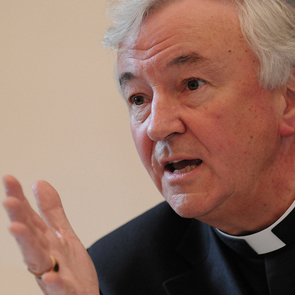A few weeks on from the Scottish referendum we know now the rise of the Scottish National Party was down to the support of the voters who, even in the Catholic heartland of Glasgow deserted Labour because they were frustrated with Westminster and Whitehall centralisation.
Meanwhile in Kent, UKIP delivered a bloody nose to the Conservatives in Thursday’s by-election. The shape of our politics is morphing at speed.
The Scottish bishops decided to stay silent on the future of national governance and their English and Welsh counterparts have said almost nothing. But in the Catholic north-west and parts of Kent the common call is that elites have failed them.
How should Churches respond?
One option is to commend those who condemn the demands of democratic governance – attacking MPs who vote against church teaching on homosexuality, sex education, marriage and so on. Such single-issue calls to alleged moral purity from bishops become invitations to abandon our common culture.
Another option is for religious leaders to call for a re-assertion of the 1945 vision of the welfare state, effectively looking to bureaucracies to solve all our needs. Hierarchical religions seem to quite like the hierarchies of the state. Generic calls to virtue provide a platform for general social comment without attending to local realities.
 Does it work? Cardinal Vincent Nichols provoked outcry in February when he said the Government’s welfare cuts were “a disgrace” but there is not yet any evidence they caused any more than a press furore. At that point he had not even met the Secretary of State responsible for welfare reform, Iain Duncan Smith, and neither he nor the Catholic Social Action Network (CSAN) acknowledged that especially among the low paid, the Government’s “welfare cap” is popular.
Does it work? Cardinal Vincent Nichols provoked outcry in February when he said the Government’s welfare cuts were “a disgrace” but there is not yet any evidence they caused any more than a press furore. At that point he had not even met the Secretary of State responsible for welfare reform, Iain Duncan Smith, and neither he nor the Catholic Social Action Network (CSAN) acknowledged that especially among the low paid, the Government’s “welfare cap” is popular.
It is to resurgent localities that we should turn to for inspiration: In Birmingham the Anglican Bishop, David Urquhart, has led a pioneering Fairness Commission to take a tough look at the city’s needs. Next month with his Catholic counterpart, Archbishop Bernard Longley, he will launch a new “covenant” between the city’s huge council and its nine major faith communities. Cardinal Nichols is, to his credit, building a Caritas agency in Westminster and the other day met with Secretary of State for Communities, Eric Pickles.
Meanwhile in Derby, the Bishop, Alastair Redfern, has helped set up a “Derby Embassy” to attract investment in the city and Liverpool’s last Anglican Bishop, James Jones, launched a convention on social need for the largest eight cities outside London. On Thursday in Winchester, the Churches joined with academics, business leaders, and policy makers to launch a new think-tank that I am involved in, the Southern Policy Centre, focused on the needs of Wessex.
Each of these particular cases seeks to tease out fresh models beyond those commended by the far-away and no longer trusted culture of "London" – not just as a place but as the self – proclaimed centre of "superior" values to the rest of England especially. These are great examples of faith leaders responding to local needs.
But there are not enough of such initiatives. Debates about the cost and health of Scotland – and London – compared to England and Wales and their regions and counties are only just beginning. Like the Scottish referendum these debates will in time articulate the anger felt by many at the failure of our centralised political settlement and the limits of its imagination. Silence and generalisations will not do. Responsible religious leaders should call all the communities they work in to a renewed conversation and to a refreshed political discussion as specific to each locality as any insurgent could hope for.
Francis Davis is a former ministerial adviser on communities and is acting chief executive of the Southern Policy Centre
Above: Cardinal Nichols. Photo: CBCEW


 Loading ...
Loading ...
What do you think?
You can post as a subscriber user ...
User comments (3)
"even in the Catholic heartland of Glasgow deserted Labour because they were frustrated with Westminster and Whitehall centralisation."
I don't agree. It was because that now most endangered of things, working class Catholic voters, were sick to death of being treated as serfs by Labour, whose only real interest was in Westminster and the south east. Thank God they seem to have woken up, though I fear Labour will keep its stranglehold by some tawdry alliance with the SNP.
"Meanwhile in Kent, UKIP delivered a bloody nose to the Conservatives in Thursday’s by-election. The shape of our politics is morphing at speed ... in the Catholic north-west and parts of Kent the common call is that elites have failed them."
UKIP also delivered a massive blow to Labour and the Liberal Democrats, not just the Tories!
I would also suggest that people in many other parts of the country not only feel failed by the elites, whether in Westminster or elsewhere, but also betrayed. In particular, there is growing anger that mass immigration has been imposed upon us without consultation and without our consent. Fortunately, the electorate is increasingly realising that the choice at the ballot box is now UKIP or 'the rest', and that if you vote UKIP you get UKIP.
Francis, the involvement do so many parishes, schools and churches in London Citizens is another ground floor initiative worthy of mention especially in respect of campaigns for a living wage and for migrant rights.
I also find parish involvement and support for food banks very inspiring.